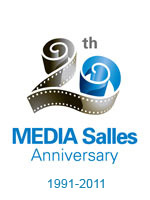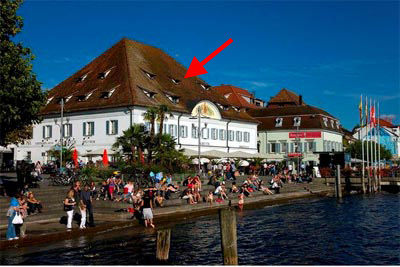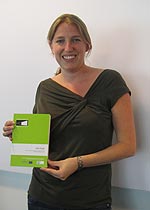
Reg.
Trib. Milano n. 418 del 02.07.2007
Direttore responsabile: Elisabetta Brunella
International Edition No. 104 - year 9 14 May 2014 |
Special issue on the occasion of the 67th Cannes Film Festival
***
|
||||||||||||||||||||||||||||||
|
||||||||||||||||||||||||||||||
ALL DIFFERENT ALL DIGITAL This column hosts portraits of cinemas in Europe and the rest of the world which are quite different from one another but have in common the fact that they have all adopted digital projection.
Cine Greth - Überlingen
Opening a second cinema in a village with only 21,000 inhabitants is part of an ambitious initiative launched in 1998 and aiming to restore the Greth's central role in the life of this historical little lake town, which today is a popular venue for tourists, especially in the summer. And the initiative has been fully successful: no-one arriving in this ancient village would ever imagine that up until a few years previously the Greth had been virtually in ruins, barely adequate for housing the ticket office serving the ferries that sail the lake. One more floor and you come to the cinema. In the large foyer, the ancient wooden pillars and overhead beams create an unusual atmosphere, so that even though the services on offer, such as the live screening of sport on the bar TV, are fully contemporary, the visitor has the impression of having travelled backwards in time. Past and present return in the three theatres: digital technology and, once again, ancient wooden beams. Nicole Lailach who manages the Greth with her husband (born into the profession, seeing that his parents are the managers of the Kammer/Tivoli cinema), is enthusiastic about digital: "Programming has become extremely simple from a technical point of view and, in addition, we can screen many more titles at the same time as towns far bigger than Ueberlingen." Whether because of the variety of its programming or because of its truly unique architecture, the Cine Greth has become a landmark both for the local community ("I know all my customers from Ueberlingen personally," continues Nicole Lailach) and for the holidaymakers who flock the medieval township in summer. |
Cine Greth will be visited during DigiTraining Plus 2014 |
WOMEN IN DIGITAL CINEMA From Digital Transition to Business Transformation
The promise sounded so good that I decided I had to help make it a reality and from that moment on I've been a woman with a mission: digitize and harvest. Luckily the objectives were already clear when I started my assignment: achieve a 100% digital landscape for the Dutch cinema industry. We set up a project group, lined-up all the stakeholders, drafted the project plan, which translated into a business plan and finally resulted in a successful and complete digital roll-out in only 14 months. By September 2012 Cinema Digitaal brought Dutch cinemas within close reach of the digital heaven, at least I thought it did. Once the technical part was finished I thought the benefits of digital could be harvested immediately. But this was obviously not the case. We hadn't finished yet, instead we had only completed the first part of the journey from analog to digital. It was then time for phase two: influencing strategy and changing processes to embed the digital mind-set. And with this next phase came my new job: business development. Early this year I joined the team at MACCS International to coordinate the roll-out of their DCinemaHub. MACCS Int. - a software development firm specialized in ERP solutions for the film distribution industry - is currently being used by over a 100 distributors, major and independent compagnies in 37 countries and this number is rapidly increasing as the company expands. It's estimated that over 50% of all bookings for cinemas worldwide are made on the MACCS Int. software platform. In the fast moving world of digital cinema MACCS Int. focused on building the right tools to support the changing needs of the industry and help it align better with the newly adopted digital cinema workflow. MACCS Int. listens closely to their customers during the transition to digital cinema. Customers often stressed that the KDM Management process in particular consumes a lot of valuable time giving both exhibitors and distributors lots of headaches. I even overheard someone calling it "the KDM inferno". The industry signaled the need for a proper solution that would support this new process and automate as many steps as possible in order to make it both effective and efficient. MACCS Int. has responded by developing a new solution that does just that: the "DCinemaHub". As an extension to any theatrical distribution software solution it fully automates the ordering and delivery of digital content. From one interface, DCP and KDM bookings are translated into orders and forwarded to any lab, depot or delivery partner of choice, to be processed. Digital labs like Technicolor receive the orders directly in their system and once processed report back their status to the DCinemaHub. The distributor that has made the booking can keep track of the logistical operation behind his desk. In the near future we shall be able to report if an issued KDM is delivered and working on screen level by connecting with the TMS in the Cinema. The simple, color-coded dashboard in DCinemaHub will show if there is something to worry about at a glance bringing ease of mind to all stakeholders. DCinemaHub is now Live in 5 countries (Germany, The Netherlands, Norway, Finland, Switzerland) and soon Denmark, Sweden, Australia, Canada, Turkey and the UK will join. Onboarding all MACCS Int. territories will be my main objective for the next two years. A challenge I cannot not pass up. |
Please join our online questionnaire at http://www.mediasalles.it/modulo
Your data will contribute to MEDIA Salles "International Database of Digital Cinemas" After registering with an individual password for his/her protection, each exhibitor will be able to enter the data regarding his/her own cinemas. The questionnaire is designed to make the compilation extremely quick and error-proof. The data registered can only be consulted by MEDIA Salles for statistical use and each company will be able to view ad edit its own data. |

MEDIA Salles' contacts and
address
MEDIA Salles
Piazza Luigi di Savoia, 24 - 20124 Milano - Italy
Tel.: +39.02.6739781 - Fax: +39.02.6690410
E-mail: infocinema@mediasalles.it
Website: www.mediasalles.it
 Yes, indeed, the cinema is right there, as indicated by the arrow: on the top floor of the Greth, a corn warehouse dating back to the XIV century and refurbished during the XVIII, located in Ueberlingen, on the north bank of Lake Constance, overlooking the landing stage, yesterday as today.
Yes, indeed, the cinema is right there, as indicated by the arrow: on the top floor of the Greth, a corn warehouse dating back to the XIV century and refurbished during the XVIII, located in Ueberlingen, on the north bank of Lake Constance, overlooking the landing stage, yesterday as today.  In 2009 I launched my career in the cinema business by writing a thesis about the impact of the transition towards Digital Cinema. To gather the information I needed I interviewed industry stakeholders and was immediately mesmerized by 'the Digital Promise'. Once digitalization was a fact it would make operations cheaper, it would be easier to handle and it would open a gateway to endless variety of content. Once digital everyone would benefit and thrive from its power.
In 2009 I launched my career in the cinema business by writing a thesis about the impact of the transition towards Digital Cinema. To gather the information I needed I interviewed industry stakeholders and was immediately mesmerized by 'the Digital Promise'. Once digitalization was a fact it would make operations cheaper, it would be easier to handle and it would open a gateway to endless variety of content. Once digital everyone would benefit and thrive from its power.